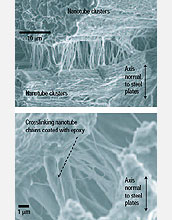News Release 05-004
Carbon Nanotube "Shock Absorbers" Excel at Damping Vibration

This image shows clusters of the carbon-nanotube vibration-damping material.
January 12, 2005
This material is available primarily for archival purposes. Telephone numbers or other contact information may be out of date; please see current contact information at media contacts.
Arlington, Va.--Researchers at Rensselaer Polytechnic Institute have developed a novel carbon-nanotube-based material that chokes vibration and may have applications for both large and small devices.
In the January 9, 2004, advance online edition of Nature Materials, the researchers describe the new material and demonstrate its usefulness as a filler to enhance traditional vibration-reduction materials.
Conducted by Nikhil Koratkar and colleagues at Rensselaer, the research arose from Koratkar's National Science Foundation (NSF) Faculty Early Career Development (CAREER) Award, which recognizes outstanding scientists and engineers who, early in their careers, show exceptional potential for leadership at the frontiers of knowledge. This award is the highest honor bestowed by NSF on scientists and engineers beginning their independent careers.
Comments from NSF:
"True to the spirit of nanoscale engineering, Koratkar's team developed unique composite materials to maximize frictional damping. Although one may argue that carbon nanotubes are too expensive to use in practical systems, there is no reason why other, less expensive, nanoscale materials cannot be incorporated to accomplish the same task. This is an excellent example of someone taking lemon and turning it into lemonade." – Yip-Wah Chung, Director of the NSF Surface Engineering and Material Design Program
"In most mechanical systems, friction is often considered to be a negative attribute because it results in wear and unnecessary energy dissipation. In this case, professor Koratkar took advantage of friction between sliding interfaces to damp vibrations." – Yip-Wah Chung
RPI press release available at: http://news.rpi.edu/update.do?artcenterkey=614&setappvar=page(1)
-NSF-
Koratkar's CAREER Award information is available at:http://www.nsf.gov/awardsearch/showAward.do?AwardNumber=0347604
Further information about the CAREER Award program is available at:http://www.nsf.gov/home/crssprgm/career/start.htm
Media Contacts
Joshua A. Chamot, NSF, (703) 292-8070, email: jchamot@nsf.gov
Mary Cimo, Rensselaer Polytechnic Institute, (518) 276-6098, email: cimom@rpi.edu
Program Contacts
Yip-Wah Chung, NSF, (703) 292-8360, email: ychung@nsf.gov
Principal Investigators
Nikhil Koratkar, Rensselaer Polytechnic Institute, (518) 276-2630, email: koratn@rpi.edu
Related Websites
For an update on Koratkar's nanotube research, see the Feb. 8, 2006, Rensselaer Polytechnic Institute press release at: http://news.rpi.edu/update.do?artcenterkey=1347
The U.S. National Science Foundation propels the nation forward by advancing fundamental research in all fields of science and engineering. NSF supports research and people by providing facilities, instruments and funding to support their ingenuity and sustain the U.S. as a global leader in research and innovation. With a fiscal year 2023 budget of $9.5 billion, NSF funds reach all 50 states through grants to nearly 2,000 colleges, universities and institutions. Each year, NSF receives more than 40,000 competitive proposals and makes about 11,000 new awards. Those awards include support for cooperative research with industry, Arctic and Antarctic research and operations, and U.S. participation in international scientific efforts.
Connect with us online
NSF website: nsf.gov
NSF News: nsf.gov/news
For News Media: nsf.gov/news/newsroom
Statistics: nsf.gov/statistics/
Awards database: nsf.gov/awardsearch/
Follow us on social
Twitter: twitter.com/NSF
Facebook: facebook.com/US.NSF
Instagram: instagram.com/nsfgov


